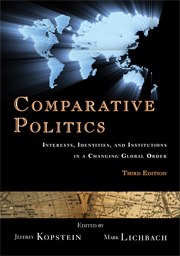Book contents
STOP AND COMPARE
from PART ONE - EARLY DEVELOPERS
Summary
EARLY DEVELOPERS: BRITAIN AND FRANCE
An important part of democracy is the role of parliaments. Much of Great Britain's history has been a constant refinement of the principle of representative parliamentary government. Through a long series of struggles and reforms, British parliamentary government emerged triumphant over the rule of kings and queens. In the course of these changes, the monarchy remained a symbol of national integration and historical continuity, but the real political power came to reside in the prime minister and his or her cabinet of ministers. Of course, even in Britain, parliamentary and cabinet government did not necessarily mean the same thing as democracy: The right to vote – the franchise – was only gradually extended to the lower classes and women, and the final reforms came about during the twentieth century.
Despite the important upheavals in British history, political scientists continue to view the British experience as one of successful gradualism, of a gradual extension of the freedoms of liberal democracy to ever-larger groups of people. In the creation of liberal democracy, the British were undoubtedly aided by the simultaneous and successful rise of a commercial and capitalist economy during the eighteenth and nineteenth centuries. This was the age of the Industrial Revolution. Although the transition to a new kind of economy was not easy, for the first time in history an economy generated large amounts of goods that could be consumed by a large number of people.
- Type
- Chapter
- Information
- Comparative PoliticsInterests, Identities, and Institutions in a Changing Global Order, pp. 135 - 138Publisher: Cambridge University PressPrint publication year: 2008

